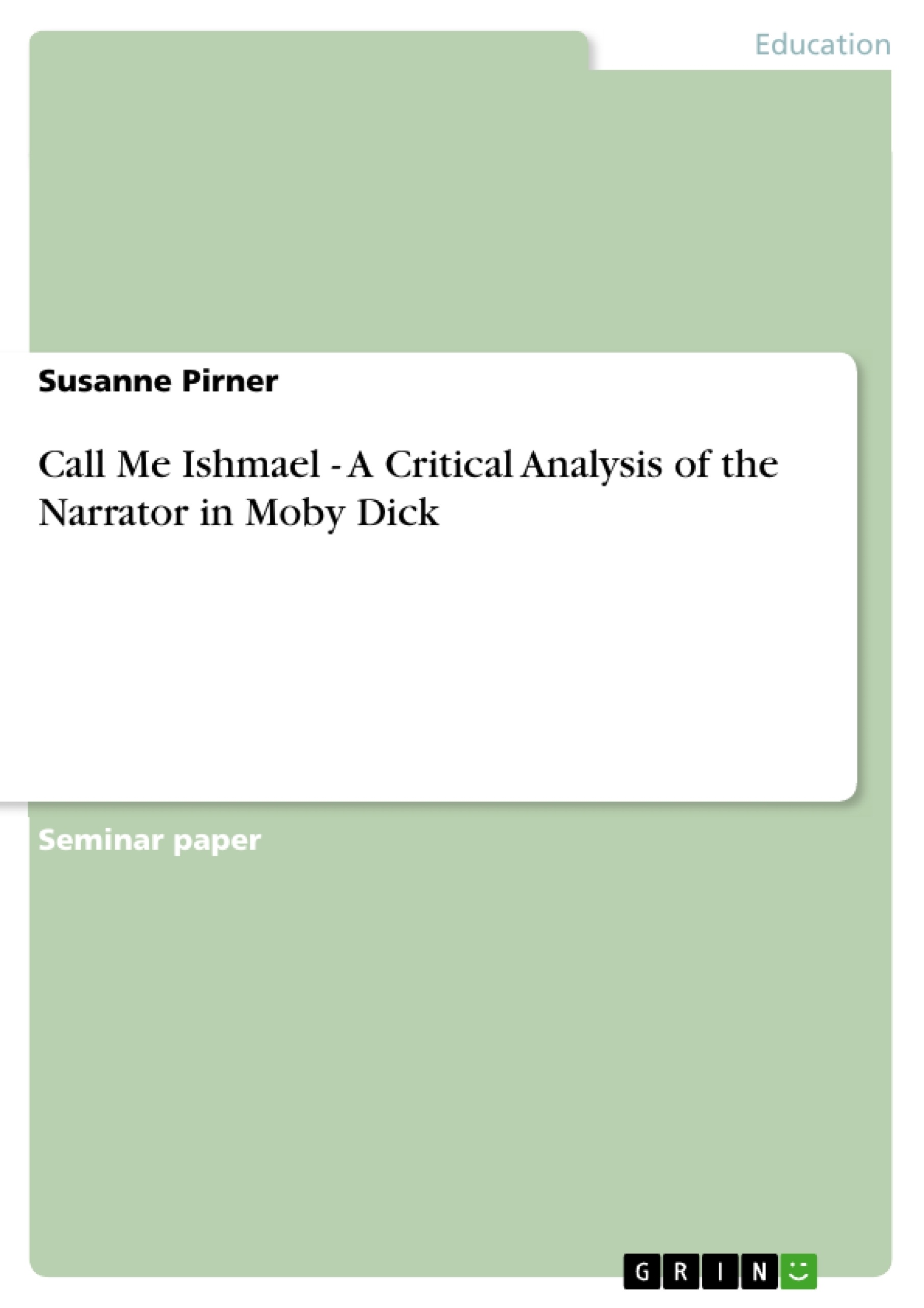Moby-Dick by Herman Melville is an epic tale of the voyage of the Pequod and the ship’s captain, Ahab, who relentlessly hunts the white Sperm Whale Moby-Dick during a journey around the world. Ever since the whale took his leg, Ahab has been seeking revenge. However the hunt ends fatally for Ahab and his crew: Moby-Dick kills them all. The whole story is narrated by Ishmael, one of the sailors on the Pequod and the only survivor of the disaster. In a detailed and impressive way Ishmael describes the things he experienced and witnessed, the different characters he met, the friendships he formed. This paper deals with an analysis of Ishmael, the first-person narrator in Moby-Dick. Next to concentrating on several aspects, it shall give an answer to the basic question: Is Ishmael is a reliable narrator ?
Table of Contents
- 1. Introduction
- 2. Self-Presentation of the Narrator
- 3. Critical Opinions about the Narrator
- 4. The Narrator's Relationship with Other Characters in the Novel
- 4.1. Ahab
- 4.2. Queequeg
- 4.3. The Crew
- 5. The Narrator as Observer
Objectives and Key Themes
This paper aims to analyze Ishmael, the first-person narrator in Herman Melville's Moby-Dick, addressing the question of his reliability. The analysis focuses on various aspects of Ishmael's portrayal, exploring his self-presentation, critical interpretations, and relationships with other characters.
- Ishmael's self-presentation and character development
- Critical perspectives on Ishmael's reliability as a narrator
- Ishmael's relationships with key characters like Ahab and Queequeg
- Ishmael's role as an observer and participant in the narrative
- The use of biblical allusions and their impact on Ishmael's character
Chapter Summaries
1. Introduction: This chapter introduces Moby-Dick as an epic tale of Captain Ahab's obsessive hunt for the white whale, Moby-Dick. It establishes Ishmael as the narrator and sole survivor, highlighting his detailed account of the voyage, characters, and events. The chapter posits the central question of the paper: Is Ishmael a reliable narrator?
2. Self-Presentation of the Narrator: This chapter delves into Ishmael's self-portrayal. He presents himself as a modest, unassuming individual, content with his life despite limited means. He describes his past experiences, including work as a schoolmaster and merchant sailor, highlighting his decision to join a whaling voyage as a simple sailor rather than seeking glory or high rank. His declaration of being a "good Christian" and his tendency to seek solace at sea during periods of low spirits are also explored. His description suggests a relatable everyman figure.
3. Critical Opinions about the Narrator: This section examines critical interpretations of Ishmael, beginning with the famous opening line, "Call me Ishmael." The chapter explores the biblical allusion to Ishmael as an outcast, connecting it to Ishmael's independence and eventual survival as the sole survivor of the Pequod's tragic fate. It emphasizes the distinction between Ishmael the character and Ishmael the narrator, highlighting the narrator's critical distance and ability to foreshadow events despite his knowledge of the outcome. The optimistic tone in the early chapters, attributed to the character's experiences, contrasts with the impending doom of the plot, creating narrative tension.
Keywords
Moby-Dick, Herman Melville, Ishmael, first-person narrator, narrative reliability, character analysis, biblical allusions, Ahab, Queequeg, whaling, sea fiction.
Frequently Asked Questions: Analysis of Ishmael in Herman Melville's *Moby-Dick*
What is the purpose of this analysis?
This paper analyzes Ishmael, the first-person narrator in Herman Melville's Moby-Dick, focusing on his reliability as a narrator. It explores his self-presentation, how others view him, his relationships with other characters, and his role as an observer within the narrative.
What are the key themes explored in the analysis?
The analysis examines Ishmael's self-presentation and character development, critical perspectives on his reliability, his relationships with key characters like Ahab and Queequeg, his role as an observer and participant, and the impact of biblical allusions on his character.
What aspects of Ishmael's character are discussed?
The analysis delves into Ishmael's self-portrayal as a modest, unassuming individual. It explores his past experiences, his decision to join the whaling voyage, his religious beliefs ("good Christian"), and his emotional responses to events. It also examines the contrast between his optimistic early narration and the impending doom of the Pequod's voyage.
How does the analysis address Ishmael's reliability as a narrator?
The analysis examines critical interpretations of Ishmael, starting with the famous opening line, "Call me Ishmael." It explores the biblical allusions to Ishmael as an outcast and connects this to his independence and survival. It also highlights the distinction between Ishmael the character and Ishmael the narrator, considering the narrator's critical distance and ability to foreshadow events.
What is the structure of the analysis?
The analysis is structured into chapters covering an introduction to Moby-Dick and its central question of Ishmael's reliability; a detailed look at Ishmael's self-presentation; an examination of critical opinions about his character; and a discussion of Ishmael's relationships with other key characters in the novel, particularly Ahab and Queequeg.
What are the key relationships examined in the analysis?
The analysis specifically examines Ishmael's relationships with Captain Ahab and Queequeg, exploring how these interactions contribute to understanding his character and the narrative.
What is the significance of biblical allusions in the analysis?
The analysis highlights the use of biblical allusions, particularly the reference to Ishmael in the opening line, and explores how these allusions impact the interpretation of Ishmael's character and his role within the narrative.
What are the chapter summaries provided in the analysis?
The analysis provides summaries for each chapter, outlining the main points discussed in each section. These summaries offer a concise overview of the different facets of Ishmael's character and their role in the narrative of Moby-Dick.
What are the keywords associated with this analysis?
The keywords include Moby-Dick, Herman Melville, Ishmael, first-person narrator, narrative reliability, character analysis, biblical allusions, Ahab, Queequeg, whaling, and sea fiction.
- Citar trabajo
- Susanne Pirner (Autor), 2005, Call Me Ishmael - A Critical Analysis of the Narrator in Moby Dick, Múnich, GRIN Verlag, https://www.grin.com/document/39861



